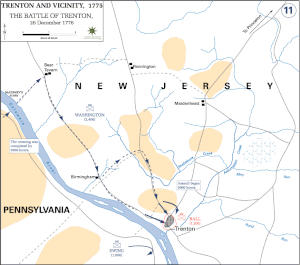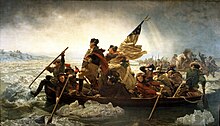Battle of Trenton
Washington's forces caught them off guard, and after a short but fierce resistance, most of the Hessians surrendered and were captured, with just over a third escaping across Assunpink Creek.
Washington, Commander-in-Chief of the Continental Army, expressed some doubts, writing to his cousin in Virginia, "I think the game is pretty near up.
"[9] At the time a small town in New Jersey, Trenton was occupied by four regiments of Hessian soldiers (numbering about 1,400 men) commanded by Colonel Johann Rall.
Honeyman had served with Major General James Wolfe in Quebec at the Battle of the Plains of Abraham on September 13, 1759, and had no trouble establishing his credentials as a Tory.
This enabled him to gather intelligence and to convince the Hessians that the Continental Army was in such a low state of morale that they would not attack Trenton.
After being questioned by Washington, he was imprisoned in a hut to be tried as a Tory in the morning, but a small fire broke out nearby, enabling him to "escape".
[11] On the evening before the battle, Hessian commander Rall was celebrating Christmas with his troops at the farm of Abraham Hunt, a wealthy merchant and farmer of Trenton.
Hunt played the role of a friendly Loyalist host, giving Rall a false sense of serenity while Washington and his troops were preparing for a surprise attack.
General John Cadwalader would launch a diversionary attack against the British garrison at Bordentown, New Jersey, to block off reinforcements from the south.
General James Ewing would take 700 militia across the river at Trenton Ferry, seize the bridge over the Assunpink Creek and prevent enemy troops from escaping.
The main assault force of 2,400 men would cross the river 9 mi (14 km) north of Trenton and split into two groups, one under Greene and one under Sullivan, to launch a pre-dawn attack.
[7] During the week before the battle, U.S. advance parties began to ambush enemy cavalry patrols, capturing dispatch riders and attacking Hessian pickets.
[14] Washington put constant watches on all possible crossings near the Continental Army encampment on the Delaware, as he believed William Howe would launch an attack from the north on Philadelphia if the river froze over.
His request for reinforcements had been turned down by British commander General James Grant, who disdained the American rebels and thought them poor soldiers.
[43] At 8 am on the morning of December 26, the Hessians established an outpost at a cooper shop on Pennington Road about one mile northwest of Trenton.
[45] Washington ordered Edward Hand's Pennsylvania Riflemen and a battalion of German-speaking infantry to block the road that led to Princeton.
Washington ordered the escape route to Princeton be cut off, sending infantry in battle formation to block it, while artillery formed at the head of King and Queen streets.
[49] Leading the southern U.S. column, General Sullivan entered Trenton by the abandoned River Road and blocked the only crossing over the Assunpink Creek to cut off the Hessian escape.
[50] Soon after, they continued their advance, attacking the Hermitage, home of Philemon Dickinson, where 50 jägers under the command of Lieutenant von Grothausen were stationed.
[50] As Greene and Sullivan's columns pushed into the town, Washington moved to high ground north of King and Queens streets to see the action and direct his troops.
[53] Lieutenant Piel, Rall's brigade adjutant, woke his commander, who found that the rebels had taken the "V" of the main streets of the town.
The Lossberg and the Rall regiments fell back to a field outside of town, taking heavy losses from grapeshot and musket fire.
[66] The Americans also captured their entire store of provisions—tons of flour, dried and salted meats, ale and other liquors, as well as shoes, boots, clothing and bedding—things that were as much needed by the ragtag Continental forces as weapons and horses.
However, historian David Hackett Fischer quotes Patriot John Greenwood, who fought in the battle and supervised Hessians afterward, who wrote, "I am certain not a drop of liquor was drunk during the whole night, nor, as I could see, even a piece of bread eaten.
"[69] Military historian Edward G. Lengel wrote, "The Germans were dazed and tired but there is no truth to the legend claiming that they were helplessly drunk.
"[71] On December 28, General Washington interviewed Lieutenant (later Colonel) Andreas Wiederhold, who detailed the failures of Rall's preparation.
The Patriot victory gave the Continental Congress new confidence, as it proved colonial forces could defeat the British in the future.
By defeating a European army, the colonials reduced the fear that the Hessians had caused earlier that year after the fighting in New York.
[62] Colonial support for the rebellion was further buoyed significantly at this time by writings of Thomas Paine and additional successful actions by the New Jersey Militia.
After six months in Germany it was shipped to New York City where the New-York Mirror newspaper lauded it with the words, "the grandest, most majestic, and most effective painting ever exhibited in America.








